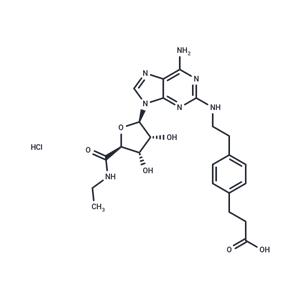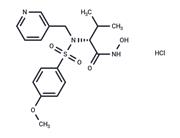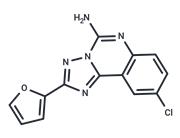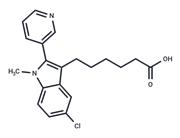| Name | CGS 21680 Hydrochloride |
| Description | CGS 21680 Hydrochloride (CGS 21680 HCl)(IC50=22 nM), an adenosine receptor agonist, exhibits 140-fold potency in A2 receptor over A1 receptor. |
| Cell Research | 10×106 MNCs from each group are re-suspended in 2 mL RPMI 1640. Cell suspensions are added with carboxy-fluorescein diacetate, succinimidyl ester (CFSE, final concentration 2.5 μM) and thoroughly mixed. After incubation in the dark for 15 min at 37°C, the staining process is quenched by adding 10 mL ice-cold complete RPMI 1640 (containing 10% FBS) and incubated on ice for 5 min. Then cells are washed twice with RPMI 1640. Cell pellets are re-suspended in complete RPMI 1640 (containing 10% FBS). The stained MNCs (1×106 cells/mL, 1 mL/well) are cultured in triplicates in 24-well culture plates in the dark at 37°C. Each well is supplied with 50 μL of Concanavalin A (ConA, final concentration 5 μg/mL) or 50 μL of P0 peptide (final concentration 10 μg/mL). 72 h later, cells are collected and stained with PE-labeled anti-rat CD4 antibody for 30 min at 4°C. Finally, cells are analyzed with a flow cytometer. |
| In vitro | CGS 21680 HCl is an adenosine A2 receptor agonist with IC50 of 22 nM, exhibits 140-fold over A1 receptor. In an isolated perfused working rat heart model, CGS 21680C effectively increases coronary flow with an ED25 value of 1.8 nM. [1] CGS 21680 binds adenosine A2 receptor with high affinity (Kd = 15.5 nM) and limited capacity (apparent Bmax = 375 fmol/mg of protein) to a single dass of recognition sites.[2] In hippocampal slices, CGS 21680 apis weak agonist on pre- and postsynaptic measures of electrophysiologicaJ activity (putative Al receptor mediated events) and is ineffective at stimulating the formation of cAMP (a putative A2 mediated response). In striatal slices, CGS 21680 potently stimulates the formation of cAMP with an EC50 of 110 nM but is ineffective at inhibiting electrically stimulated dopamine release. [3]CGS 21680A is the hydrochloride salt, while CGS 21680C is the sodium salt of CGS 21680. |
| In vivo | CGS 21680A is active p.o. in the spontaneously hypertensive rat at a dose of 10 mg/kg with efficacy for up to 24 hr. CGS 21680A caused a transient (60 min) increase in heart rate. [1]CGS 21680 is a potent depressant of the spontaneous, acetylcholine and glutamate evoked firing of rat cerebral cortical neurons. [4] |
| Storage | Powder: -20°C for 3 years | In solvent: -80°C for 1 year | Shipping with blue ice. |
| Solubility Information | DMSO : 53.6 mg/mL (100 mM)
|
| Keywords | CGS-21680 | Inhibitor | CGS-21680 Hydrochloride | CGS 21680 | CGS 21680 Hydrochloride | inhibit | CGS21680 | CGS21680 Hydrochloride | Adenosine Receptor | P1 receptor |
| Inhibitors Related | Theophylline monohydrate | Diphylline | Acefylline | Nitrobenzylthioinosine | Aminophylline | Inosine | Theobromine | Istradefylline | Theophylline | Adenosine antagonist-1 | Doxofylline | FK-453 |
| Related Compound Libraries | Bioactive Compound Library | Anti-Neurodegenerative Disease Compound Library | Membrane Protein-targeted Compound Library | Neurotransmitter Receptor Compound Library | Anti-Viral Compound Library | NO PAINS Compound Library | Bioactive Compounds Library Max | GPCR Compound Library | Anti-COVID-19 Compound Library | Anti-Hypertension Compound Library |

 United States
United States



